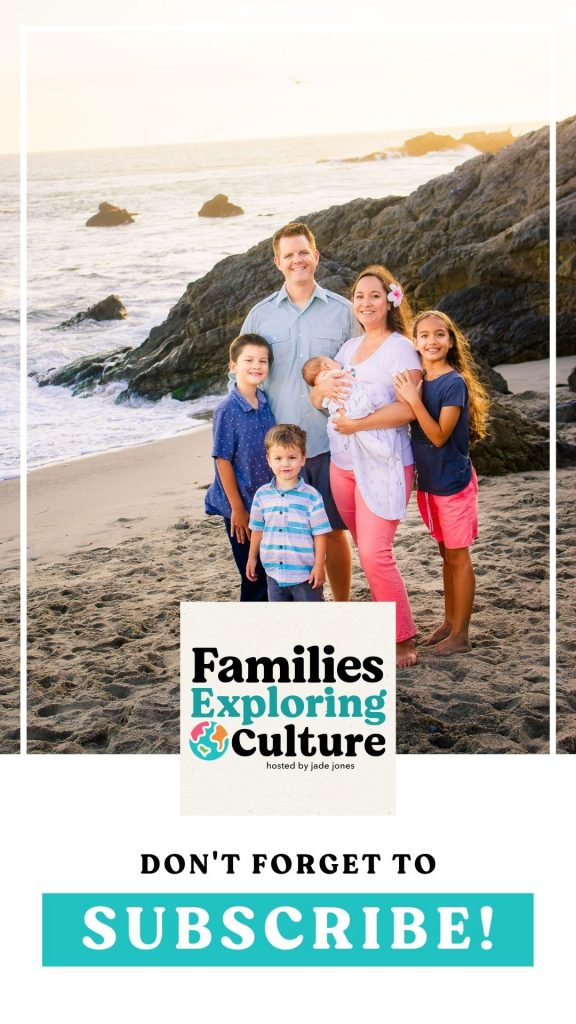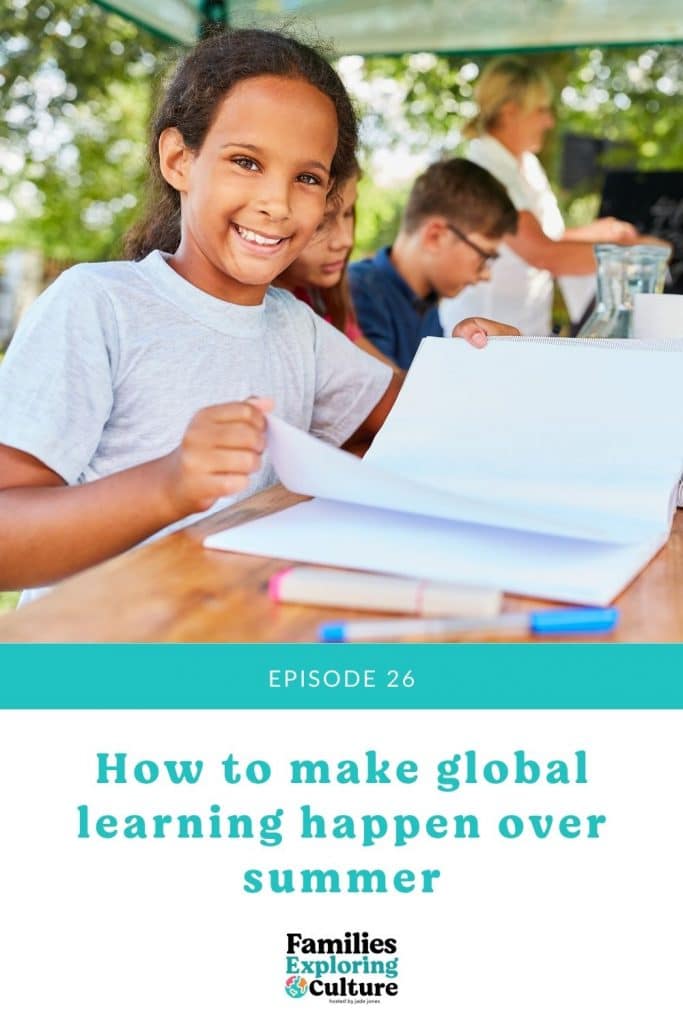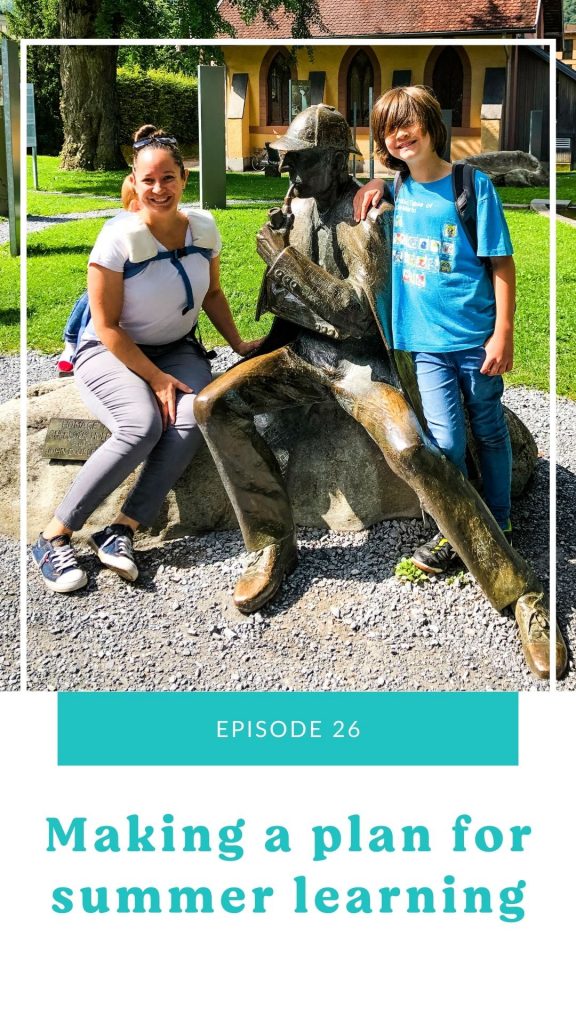26: Making A Plan For Summer Learning
In this final episode of season 1, I recap what we have learned and help you come up with an action plan. Now is the perfect for making a plan for summer learning to make cultural exploration a part of your family routine
Table of contents
I want to thank each and every one of you who have listened to this first season of the podcast. When I started this, I hoped that a few people would listen in. Looking back at this year, I am so grateful that these episodes have been listened to over 1,000 times! It may not seem like a lot but I am overwhelmingly grateful for each and every single listen. I know that helping even a few families to branch out and explore new cultures makes a difference.
In this last episode of season 1, I thought this would be a great time to review what we’ve learned and to help you come up with an action plan to make cultural exploration a part of your family routine.
Cultural Exploration at home
Summer is a great time to incorporate global education activities whether you have big or small travel plans. If you aren’t going anywhere, or you think you can’t find cultural opportunities, don’t give up! There are lots of ways that you can do this without ever leaving home.
In episode 3, I talked with LJ Sikahema about his company Lokua Labs and their travel from home concept and in episode 9, mom and former teacher Kristen shared how she and her family explored the world through their self-made program called Around The World In a Summer.
There are so many ways to dive in and explore the world like using one of the virtual field trips I have on my blog. I also have links to other virtual field trips in my region resource guides and I will, of course, have direct links to those in the show notes.
Creating a virtual field trip
Here are some tips on how to put together your own virtual field trip:
- Start by looking for music, art, dance, food, or important places for a specific region or culture. This initial research will help you in the next step. So, for example, when I was making my Brazilian culture virtual field trip, I looked for Brazilian music styles which helped me find specific names of styles to look for on youtube and spotify.
- Look for resources on YouTube, Instagram, Pinterest, Spotify, and Google. I always try to find resources from creators who are from that culture. This can be difficult and can take some digging but do the best you can. The reason for looking for native creators is that they can give important cultural insight and understanding that those of us from the outside will miss. Disclaimer: make sure to preview any videos before you share with your kids. Most of the time it’s not a problem, but sometimes you get rude surprises.
- Search for books to read at your local library. You can find titles to read from Instagrammers like Here Wee Read (2 “e”s in we), Inclusive Storytime, Shelves of Color, Raising a Legacy, Mrs. Chavez Reads, Little Pasifika Readers, and more. You can also look for read alouds on YouTube.
- Learn a bit about the language or languages spoken. If you are feeling inspired, try learning the language as a family. Adelaide of Talkbox Mom shared some great tips on why we should learn a second language and how to do so in episode 11.
- Find some recipes to make at home! You can find videos on Youtube about popular street foods or most popular dishes for a given country. Kids are much more open to trying things that they see someone “cool” eating. There are lots of amazing bloggers and youtubers out there sharing their cultural foods as well. This is also a great chance to visit your local international market to look for ingredients or ready to eat foods you can add to a meal. In episode 5, Chef Mireille shared some fabulous tips on how to connect food and global learning.
Important Reminders
Now, if you are listening and feeling overwhelmed, take a deep breath and let it out. I’m going to give you some important permission right now- you don’t have to try and do all of these! You are under no obligation to do a deep dive into any topic. If you think your family would enjoy one of these topics, then go for that. If it is something as simple as watching a few videos on YouTube or reading a book or making one dish, that is enough!
It’s so easy to get carried away and want to do all the things, but I know that our families will benefit from small changes and discoveries we make over time. Little experiences can build up and you will find that as you add in mini-experiences, they will become more routine. It’s about building a habit of exploration.
If you are thinking to yourself, “my kids don’t eat anything but chicken nuggets, there is no way that I can get them to eat anything fun”, don’t worry you are not alone! We talked about this topic in two different episodes this season: in episode 6, nutritionist and mom Alex gave awesome tips for introducing new foods to kids and mom and food blogger Jenni shared how to teach kids how to talk about food in episode 23. I also have a guide on my blog on how to introduce international foods to kids with tons of tips.
Interested in moving abroad?
I also get lots of messages on instagram about moving abroad and have had lots of conversations about what led us to become expats. Leaving your home country and becoming an expat can be really daunting- thinking about moving away from family, needing to learn to navigate new systems and possibly a new language- it’s really overwhelming to think about it.
Yet, I know that for our family, this has been an incredible season of growth and has led us to experiences we never could have had at home. I also shared in episode 12, the biggest lessons we learned in our first year abroad, some of which were realizations that we unfortunately never made while being in our home country.
And in this first season, I have interviewed 7 other expats who have shared some of the challenges they have had. Yet, all of them have also felt that the decision to move abroad for them was an enriching, growing experience.
Being able to move abroad is a definite privilege, and so is traveling. There are so many insights to be gained by seeing people living life in a way that may be different than our own. Since leaving the United States, we’ve made some lifestyle changes. We have learned to live without a car which was a big step for our family of 6. It was hard at first, but I’ve found that most of the time I don’t miss having a car and that no matter where we move, we hope to keep the biking culture we have learned from the Dutch as a part of our family culture.
Finding local cultural opportunities
Again, even if you are unable to travel or move abroad, there are opportunities most likely right in your area! Remember, you don’t have to travel the world to explore the world.
Look for festivals celebrating certain cultural holidays like Lunar New Year. You can also look for a new restaurant to visit that has a cuisine you are not familiar with. Even if you go to a restaurant that you already know, try something new. Look for a museum that you can visit or any special exhibits that might be in your area.
You might be surprised at how many opportunities there are locally. In episode 25, mom and travel blogger Molly shared great tips on how to plan family outings and different ways to explore locally that will be really helpful as you make a list of ideas.
Season 1 takeaways
For me, the biggest takeaway this season is that despite all of the things that make us unique, all the differences that we seem to have, there are also so many things that we share! I have loved learning about other cultures and having my kids be so excited because someone likes something that they like too.
I have also noticed that once I learn about a culture or country, they seem to pop up everywhere! It wasn’t until after we moved to the Netherlands that I noticed references to places here in movies, books, and in the news. It felt like the Netherlands was everywhere and I was baffled on how I hadn’t noticed these references before.
What I realized is that if I don’t know anything about a place, that place’s name holds no relevance to me. I might see a countries’ name or a mention of a place there but essentially my mind glosses over it because I have no frame of reference for it. But having friends from Ghana and Iceland means that everytime I hear something about those countries, my brain wakes up! It’s like a little switch that tells me to pay attention. That light switch moment is what we are going for.
I recently read a fantastic book called Unpack Your Impact by teachers Naomi O’Brien and Lanesha Tabb and the process they have undergone to build a culture centered curriculum. They talk about those light switch moments and how kids really do internalize all the information they get and start making these connections. Even if you aren’t a teacher, I highly recommend this book for anyone wanting to have a culture centered focus at home.
How to make a plan for your family?
So how do you make a plan that will work for your family? Take these suggestions and pick out the 1 or 2 aspects that will appeal most to your family. You can ask your children for suggestions on where they would like to explore or make a short list yourself. Then, pick 1 place to start with. See if there are already resources available, and if not, set a timer for 15 or 20 minutes and see what you can find in that time. If you have older children, this can be something you put them in charge of.
My best advice I can give is to not force it.
If your family loves music or art but not food, don’t try and force everyone to try new foods! Visit a museum or find a concert to watch or attend. Maybe your children will love learning more about the styles people wear in different places or how fabric is made. Great! Let them dive in there.
Perhaps they are plant lovers and enjoy drawing flowers, so look at different flowers from around the world. Let them find their favorites to copy or to make a catalogue of the flowers and where they are from.
It’s okay to stick to areas and topics that are interesting to your family. You don’t have to learn everything, the goal is to learn something you didn’t know before.
Final Thoughts
Most importantly, remember that learning about aspects of a culture helps us to connect to the people of that culture. They are families just like ours, people just like us, with hopes and dreams, worries and fears, talents and follies. If given the chance, we can find things that will connect us- shared interests or shared experiences. That connection is what we are seeking. It is how we expand our understanding, expand our circles, and enrich our lives.
Well, with that, I am wrapping up this first season! Thank you again for joining me on this journey as it is as much a journey for my family as it may be for yours!
I also invite you to join me on Instagram. On my instagram account, Jonesin For Taste, I share lots of information and resources about other cultures as well as mini-guides and mini-virtual field trips to help your family explore more. I would love to have you join us there and send me a message letting me know what you would like to see in this next season.
I wish you a happy summer exploring with your family!
Thank you for joining me on this journey! Happy exploring!

Other episodes you may like
- 03: Travel From Home
- 05: Connecting Food and Global Learning
- 09: Developing a Global Curriculum for Your Kids
Listen to this episode
Show notes links
Podcast episodes available here: https://jonesinfortaste.com/podcast/
Follow Jonesin’ For Taste on Instagram to catch all of our latest adventures
Guide on how to teach your children to be world explorers available here: https://jonesinfortaste.com/how-to-world-food-explorers/


